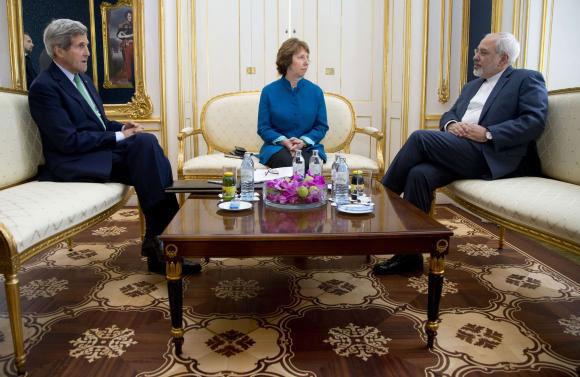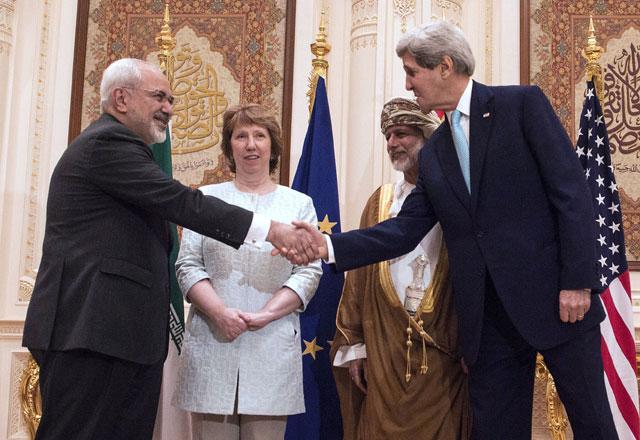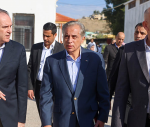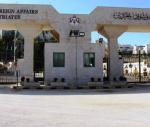You are here
Kerry urges Iran to make ‘hard choices’, says US ready to walk
By Reuters - Jul 05,2015 - Last updated at Jul 05,2015
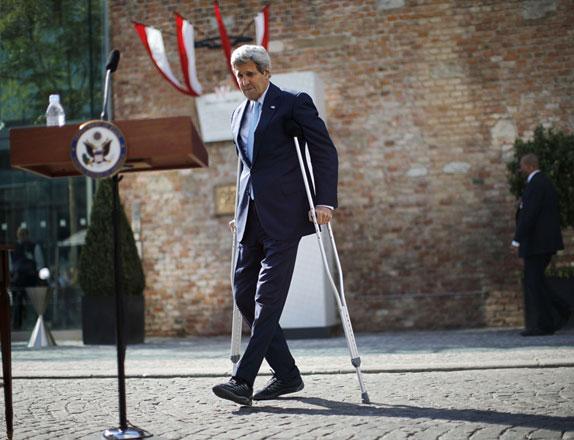
US Secretary of State John Kerry walks using crutches to deliver a statement on the Iran talks in Vienna on Saturday (AFP photo)
VIENNA — An Iranian nuclear agreement is possible this week if Iran makes the "hard choices" necessary, but if not, the United States remains ready to walk away from the negotiations, US Secretary of State John Kerry said on Sunday.
Speaking after his third meeting of the day with Iranian Foreign Minister Mohammad Javad Zarif, Kerry said they had made "genuine progress" in talks over the last few days but "several of the most difficult issues" remain.
"If hard choices get made in the next couple of days, made quickly, we could get an agreement this week, but if they are not made we will not," he said outside the hotel where talks between Iran, the United States and five other powers are being held.
Foreign ministers from Britain, China, France, Germany and Russia began arriving on Sunday evening as the major powers make a push to meet Tuesday's deadline for a final agreement to end the 12-year-old dispute.
Kerry said negotiators were still aiming for that deadline, but other diplomats have said the talks could slip to July 9, the date by which the Obama administration must submit a deal to Congress in order to get an expedited, 30-day review.
The agreement under discussion would require Iran to curb its most sensitive nuclear work for a decade or more in exchange for relief from sanctions that have slashed its oil exports and crippled its economy.
US President Barack Obama's administration, which has been accused of making too many concessions by Republican members of Congress and by Israel, remains ready to abandon the talks, Kerry said.
"If we don't have a deal and there is absolute intransigence and unwillingness to move on the things that are important for us, President Obama has always said we're prepared to walk away," he said.
European officials also said the onus was on Iran to cut a deal. After arriving in Vienna, French Foreign Minister Laurent Fabius told reporters the main question was whether Iran would make "clear commitments" on unresolved issues.
‘Four or five issues remain
The top US and Iranian diplomats met for a sixth consecutive day on Sunday to try to resolve obstacles to a nuclear accord, including when Iran would get sanctions relief and what advanced research and development it may pursue.
Keeping up a what has been a steady stream of criticism, Israeli Prime Minister Benjamin Netanyahu said the United States and major powers were negotiating "a bad deal".
"It seems that the nuclear talks [with] Iran have yielded a collapse, not a breakthrough," he said according to remarks released by his office, saying the deal would pave the way to Iran making nuclear bombs and increasing regional aggression.
US Senate Foreign Relations Committee Chairman Bob Corker, a Republican, told the CBS "Face the Nation" programme he had urged Kerry to "make sure these last remaining red lines that haven't been crossed — they have crossed so many — do not get crossed".
While they have made some progress on the type of bilateral sanctions relief that Iran may receive, the two sides remain divided on such issues as lifting United Nations sanctions and on its research and development of advanced centrifuges.
"Many of the issues related to sanctions have been resolved, and there are four or five issues that remain including the important topic of ensuring both sides' steps correspond to each other and happen at the same time," Iranian Deputy Foreign Minister Abbas Araqchi was quoted as saying by the ISNA agency.
The major powers suspect Iran of trying to develop a nuclear weapons capability. Iran says its nuclear program is solely for peaceful purposes such as producing medical isotopes and generating electricity.
Diplomats close to the negotiations said they had tentative agreement on a mechanism for suspending US and European Union sanctions on Iran.
But the six powers had yet to agree with Iran on a United Nations Security Council resolution that would lift UN sanctions and establish a means of re-imposing them in case of Iranian non-compliance with a future agreement.
In addition to sanctions, other sticking points include future monitoring mechanisms as well as a stalled UN probe of the possible military dimensions of past Iranian nuclear research.
Another is Iran's demand to be allowed to do research and development on advanced centrifuges that purify uranium for use as fuel in power plants or weapons.
Related Articles
Iran, the United States and other world powers are all but certain to miss Monday's deadline for negotiations to resolve a 12-year stand-off over Tehran's atomic ambitions, forcing them to seek an extension, sources say.
Iran is pushing what it portrays as a new compromise proposal in nuclear talks, but Western negotiators say it offers no viable concessions, underscoring how far apart the two sides are as they enter crunch time before a November 24 deadline.
Iran, the United States and European Union will hold an unscheduled second day of talks on Monday on disagreements blocking resolution of a dispute over Tehran's nuclear programme, a US official and Iranian state media said.


